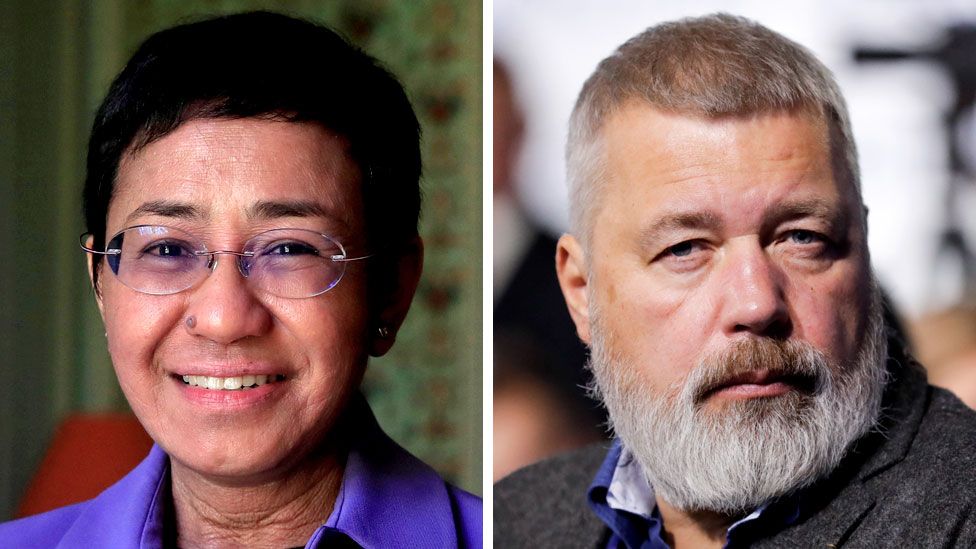It is interesting to note that in the first place, there never was no Nobel Prize for Journalism or Freedom of Expression. Yet, the Norwegian Nobel Committee awarded November 8 two journalists – Maria Ressa of the Philippines and Dmitry Muratov of Russia –the Nobel Peace Prize. Free speech is not only a key element of democracy, it is integrally connected with a tolerant society. The choice this time is unlike several other previous winners of this segment of Nobel Prize that were mired in controversy. The selection of some of the earlier winners raised eyebrows as their credentials for advancing the cause of peace were called into question by many. But, this time, there has been no opposition to the selection since the threat to freedom of speech and expression has assumed serious proportions across the world. This is the biggest danger to peace. No wonder the Nobel Committee Chairwoman Berit Reiss-Anderson, while announcing the names of the winners, said the two journalists represent all journalists who stand up for freedom of the Press in a world “in which democracy and freedom of the Press face increasingly adverse conditions.” Peace becomes threatened in the absence of free, independent and fact-based journalism that act as a bulwark against abuse of power, lies and false propaganda by a repressive regime.
Conscientious journalists and social activists all over the world have been championing the cause of freedom and democracy for years. Scores of them have been persecuted and murdered for their unflinching devotion to truth, justice and fairness. The brutal murder of Saudi journalist Jamal Khashoggi is the most prominent example of recent times, while many others lost their lives defending their right to tell the truth about repression by the Taliban in Afghanistan during the past two decades. Such journalists try to remain steadfast to their lofty goals even when the odds are heavily stacked against them. Authoritarian regimes put up insurmountable obstacles before them in the form of threats, false cases, abuse of the laws and torture in the lock-up. This has been the modus operandi used by enemies of peace and democracy over the years. Indian journalists and civil rights activists have a good measure of such experience, especially, in recent times. The most recent example is of Raman Kashyap, a journalist who lost his life in the Lakhimpur Kheri incident where the car of Union minister of State for Home Ajay Mishra’s son Asish Mishra drove through a gathering of mostly farmers and allegedly killed Kashyap along with farmers.
Maria Ressa and Dmitry Muratov have been chosen for the Nobel Peace Prize for having braved the fury of leaders of the Philippines and Russia after exposing corruption and misrule in their respective countries. To underscore the need for journalists closing ranks in the cause of peace and democracy, Muratov dedicated his award to six contributors to his Novaya Gazeta newspaper who had been murdered for their work of exposing human rights violations and corruption. He recited the names of the slain reporters and activists whose portraits hang in the newspaper’s Moscow headquarters. Interestingly, the only other Russian who had won the Nobel Peace Prize before Muratov was the former President of the erstwhile Soviet Union Mikhail Gorbachev who contributed some of his Nobel Prize money to help Muratov launch his newspaper in the early post-Soviet days.
Ressa, who shares the prize with Muratov, is the first individual winner of a Nobel in any field from the Philippines. She is the co-founder of the Rappler which has grown into a prominent voice through investigating journalism against large scale killings during a campaign against drugs. As is the pattern autocrats have been following in different countries, the administration of President Rodrigo Duterte filed several cases against her because of her writings against the President. She was named Time Magazine Person of the Year in 2018 for standing up against media intimidation. Her legal battles have caused global concern about the harassment of the media in the Philippines which was once a standard bearer for Press freedom in Asia. To put the perspective most emphatically, she told the media the Nobel Prize she has won is “a global recognition of the journalist’s role in repairing, fixing our broken world.”
Likewise, Muratov has announced he and his paper will leverage the prize in the interests of Russian journalism which “(the authorities) are now trying to repress.” Strengthened further by the recognition, he has decided he would try to help his countrymen who have been branded as agents of foreign powers, treated like dirt and exiled from the country. Curiously, the Russian government has lauded Muratov for winning the prize.
The Nobel Peace Prize for the two journalists will surely boost the morale of fearless critics of abuse of power. Reiss-Andersen said the Nobel committee intended the award to send a message about the importance of rigorous journalism at a time when technology has made it easier than ever to spread falsehood. It is common knowledge how the media can influence people for which the Press and fact-based, high-quality journalism are more and more restricted. The last time a journalist got the prize was eight decades back in 1935 when the German Carl von Ossietzky received it for revealing his country’s secret post-war rearmament programme. Incidentally, it was an expose on a fascist regime and now fascism is rearing its ugly head in many countries in different garbs.
